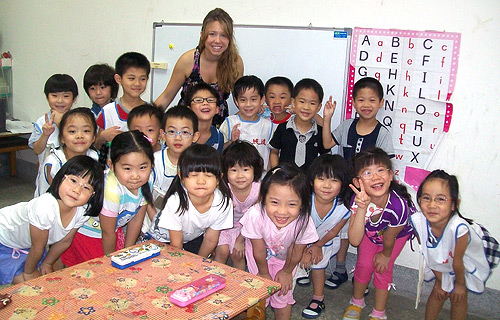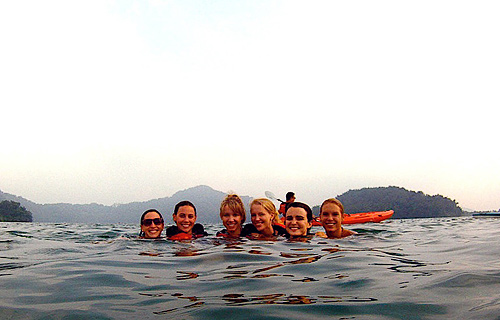Ni Hao DePauw
September 1, 2011

Every morning, Danielle R. Strohmeyer ’10 heads to a job where she can’t speak the native language. It isn’t a lack of knowledge or practice – she studied Chinese for four years as an undergrad, including a semester abroad in Beijing. She’s paid to speak English.
Strohmeyer is one of nine DePauw alumni teaching at Tam Kang, a private school just outside of the Taiwanese capital, Taipei. More than 23 million people occupy Taiwan, an island one-third the size of Indiana, but you’d be hard-pressed to find many other blonde, blue-eyed people there. That’s not such a bad thing in her line of work – as far as English teachers from America go, she certainly looks authentic. To her students, she brings something new and exciting to the classroom. From Strohmeyer’s point of view, so do they.
“The students can be so entertaining,” Strohmeyer says. “One little boy told me he wants to go to America because he wants to have a cheeseburger. Another one wants to go because he heard we have ‘advanced science and mathematical programs.’ He’s 10.”
Those comments sum up life at Tam Kang. Kids are still kids, but at a private school in the capital of a powerful Asian economy, cheeseburgers aren’t the only difference between here and there.
Strohmeyer’s elementary classroom at Tam Kang has two full-time teachers – one English speaker and one Taiwanese. They support each other during the day, splitting their time between teaching and grading, and sometimes stirring a student from an unscheduled nap. At the high school level, English teachers act more like tutors, helping students brush up their language skills before leaving for college.
“It’s a good job,” Strohmeyer says. “We’re paid well and our housing is provided along with insurance. And it’s a job where you feel like you’re doing meaningful work. I’m in love with the kids.”
 Some of Tam Kang's recent DePauw hires cool off in Taiwan's Sun Moon Lake.
Some of Tam Kang's recent DePauw hires cool off in Taiwan's Sun Moon Lake.
Rather than slogging through a crowded jobs market, many recent college graduates like Strohmeyer are choosing short-term commitments to programs such as Teach For America or the Peace Corps. This year Teach For America accepted a record number of new teachers – among them, 16 members of DePauw’s Class of 2011, ranking seventh among small colleges. It was also the largest group of DePauw graduates to head to Tam Kang since 2007, when Professor of Asian Studies Sherry Mou first found a contact at the school.
Mou, a native Taiwanese, thought the school’s diverse – and bilingual – curriculum matched up well with what DePauw students had to offer.
“Tam Kang is one of the oldest and most renowned private schools in Taiwan,” Mou says. “It has an unusual curriculum that emphasizes music and the arts. I thought it would be a good fit for DePauw graduates, especially with our programs in those areas. Its English department always hired native English speakers to teach there, but I learned that the school relied on headhunters to find the foreign teachers they needed. The process was costly, and the teachers were not always right for the school and its students. I thought DePauw graduates – young, fresh and eager – would be much better.”
That first year, two graduates left for Tam Kang based on the Mou’s promise of a job at a Taiwanese school. Even when Strohmeyer joined in 2010, the process hadn’t changed. Tam Kang administrators took for granted that Mou had a good eye for potential, and they turned out to be right.
“The school loves DePauw people because they’re very hard working,” Strohmeyer says. “You also have to be someone who can communicate with kids. If the kids don’t want to talk to you, they won’t put in the effort. The recent DePauw graduates who have come to Tam Kang have been the kind of people whom the students gravitate toward."
Last year, after student interest swelled, DePauw put in place a formal process for interviewing with Tam Kang. The new approach gives students a chance to ask questions and become familiar with a potential situation before committing to teach for a year halfway around the world.
Though China claims the island as a territory, the Taiwanese have governed themselves independently since the end of the Chinese Civil War in 1950. Taiwan is most of what remains of the losing side of the conflict, formally the Republic of China, having ceded the mainland.
Strohmeyer, who has lived on both sides of the Taiwan Strait, says that while China was a great place to visit, Taiwan has been a great place to live as a foreigner. “It’s appropriate that Taiwan is between China and the United States because, culturally, that’s what you find – it’s a middle ground.”
Later this month, DePauw’s Office of Civic, Global and Professional Opportunities will host a videoconference with Strohmeyer and other alumni at the school. More information will be provided on the Professional Opportunities website.
